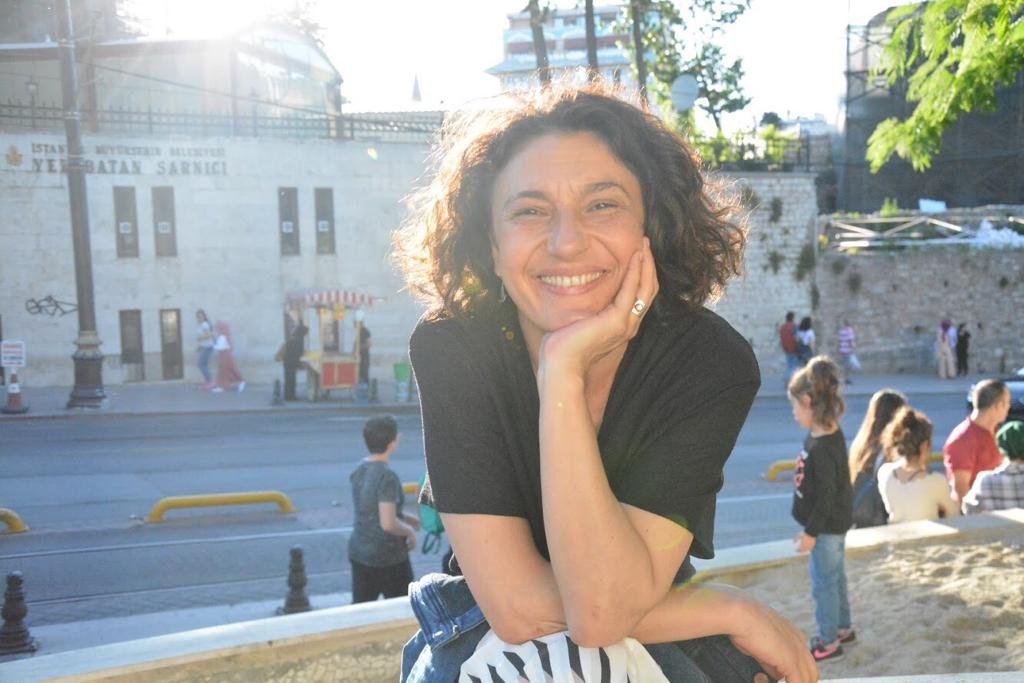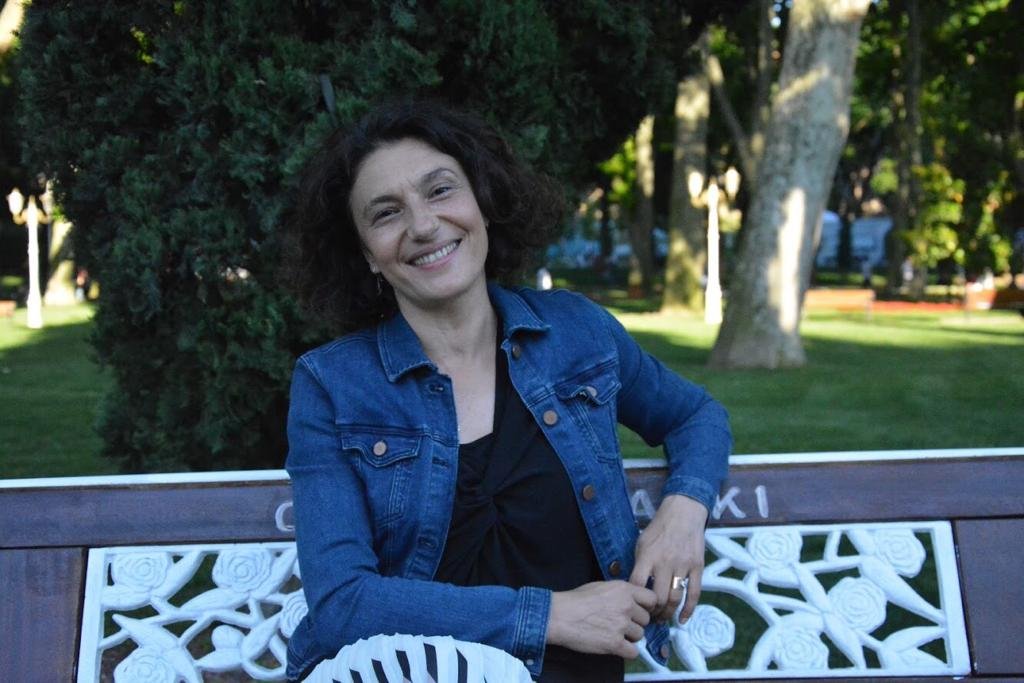In Conversation with Gülsüm Kav: Feminist Activism in Turkey, 2023 Elections and Earthquakes


1. Could you please introduce yourself and tell us how you first got involved with feminist activism?
My name is Gülsüm Kav. I am one of the founders and representatives of the We Will Stop Femicide Platform. How I got involved with feminist activism… although I have noticed forms of inequality since childhood, I gained consciousness in high school and at university. But after I completed my bachelor’s degree and moved to Istanbul, I participated in an organised women’s movement. However, we established our platform much later.
In the first years I lived in Istanbul, there were more honour killings in Turkey. The experience gained on this topic was substantial. Then the nature of murders changed: not the honour, not family councils, but a more modern phenomenon – suppression of women’s right to take decisions, gender-based murders which we today conceptualise as femicide has taken over. The murder of Münevver Karabulut became a cornerstone in 2009. In 2010, we established the We Will Stop Femicide Platform just for this goal. We made a broad call, together with women from all participating women's institutions, individuals, political parties, professional organisations, and LGBT+ organisations, and so on. We organised demonstrations, carried pictures of women who were murdered, and unfortunately with every new murder, we seek justice.
2. Could you please introduce the We Will Stop Femicide Platform to our readers?
When the platform started out, there was a new problem which was disguised. Femicides were considered “ordinary forensic cases”, “passion murders”, etc. We wanted to reveal the truth. After Münevver's murder, we didn't know what to do at first, but we went to Münevver's family and said that "you are never alone". When the case was opened, we started to follow the case; it charted a path for us. Later on, when we heard of a new femicide, we went there, too. We took care of the victim’s struggle for justice, helped families in their search for justice, and we said we would be with them. Thus, we started the activism of participating in litigation processes. As I said, we did not plan all the multi-faceted activities we do today in the beginning, they were formed as we progressed through struggles and needs that we had experienced. For instance, we also needed to obtain data on femicides. We thought that public institutions had recorded these. We asked for data via petitions, but we were informed that national authorities were not keeping any data on this topic – no way of reporting system of femicides. So we initiated our own reporting system in addition to participating in litigation processes with victims’ families.
Around this time [2011–12], it was important for us to sign the Istanbul Convention and the enactment of a new protection law just at this time because we are also aiming to keep women alive, not only after harm and death but also to implement protection in the light of the Istanbul Convention. We were able to draw an integrated scope of activities, including realising gender equality.
However, due to the political atmosphere in Turkey, the next developments have been all about the suppression of rights and freedoms of women, and the pressures on women brought about by moving away from secularism. Hence, we expanded our scope even more and established “Women’s Assemblies” – which is a much broader umbrella platform. Today, as a platform, our institutional activities continue but also as the broader coalition of Women’s Assemblies, our fight continues and expands through uniting and organising events in many provinces of Turkey. Above all, we work towards the survival of women, the implementation of gender equality principle of the Istanbul Convention in order to create a Turkey where women no longer suffer from violence, where women regain all their rights and freedoms.
3. In terms of women's rights in Turkey, what are the most pressing issues?
Violence against women. Every form of violence is experienced in its heaviest form – economic, sexual, physical, and psychological… mortal situations in the heaviest dimension, and even more severely, we have seen an increase in suspicious female deaths in recent years. We see that this is the most urgent problem in recent years, and we have also established a special organisation just for this issue. However, this is not just our special opinion, it has been demonstrated and proven by many studies that violence is the leading issue for women in Turkey. In addition, it is clear that the basis of such violence is based substantially on economic violence. Women’s employment is very problematic compared to many countries and that women's unemployment and its hidden dimension are very heavy, which makes women vulnerable to violence. We think these two issues are intertwined. Nowadays, we think that one of the most important issues for women is the next general election. The election is historically crucial because Turkey is going to the elections with the most fundamentalist, misogynistic alliance in its history. As if withdrawing the signature from the Istanbul Convention was not enough, this [Islamist] alliance is against the protection law no 6284, and all other rights of women, such as the right to alimony, the right to civil marriage, the right to inheritance, even the right to be elected. The rights of centuries we have gained through education, might be in danger. That's why I think that the most important issue for women now is to fight for elections and to remove the ruling party from power.
4. In the aftermath of the Turkish Government's withdrawal from the Istanbul Convention, what happened? But before that, it would be great if you could explain shortly what the Istanbul Convention is and why it is so important.
The Istanbul Convention protects the rights of not only women, but all disadvantaged groups who are likely to be exposed to violence in the household and explains the ways to have a life free from violence for these groups, especially women, by assigning concrete tasks to concrete institutions, and by dealing with the gender inequality at the root of violence. It is a Convention that has a significant difference from all other documents because of this fact. After withdrawing from the Istanbul Convention, we observe that the nature of violence has changed, and the number of suspicious women's deaths has increased in Turkey. While the numbers have increased so have the opportunities to hide it. Namely; for example, official institutions do not report suspicious female deaths. Thus, the number of femicides may seem to have decreased. This is a distortion of truth. Also, the increase in forms of violence as well as attacks on all other modern [women’s] rights have become more reckless and bolder. Perpetrators of all forms of violence have gained more courage… the right of women to alimony, the forced marriage of girls at an early age, child abuse… [these rights and protections] are all under attack. Therefore, the Istanbul Convention is not only about the fight against violence but also the equality policies at its core. We hope, we believe, and we fight for the fact that Turkey will re-sign the Convention after the elections, and that policies not only about violence but also about equality will be implemented.
5. Can you tell us more about how earthquakes have affected women and girls in Turkey? Is the Platform operating in the earthquake zones?
The earthquake caused massive destruction. It has heavy implications for the whole society, but it affects women and girls much more unequally. As in all extraordinary situations, the violation of women's rights increased even more with the earthquake. From the beginning, from the moment of the earthquake, women have had difficulties. Afterwards, women were the group that could not meet their basic needs the most in the collective living quarters. There was even a struggle to access the toilet and hygiene products for a very long time. And when collective living quarters were established, the risk of violence and abuse increased because there was a violation of privacy; there were security problems so we started to hear [about them].
If support systems are not created for women, we think the long-term consequences will be more severe. Because, due to the sexist division of labour, the burden of re-establishing and maintaining life is on the shoulders of women and girls at home after the earthquake – as if the earthquake only happened to women – just as the burden of care and housework was left to women before the earthquake. All of this has very unequal consequences, and it is reflected in education. That's why we are trying our best to follow carefully and to prevent this inequality. In earthquake regions, our organised friends from women’s councils continue supporting in those provinces. Again, we are in pursuit of monitoring violations of women’s rights in the whole region.
6. Have there been any improvements in the consequences for women and girls of the 2023 earthquakes compared to the 1999 earthquake?
We had to learn a lot from the 1999 earthquake. First, we had to build buildings that would not be demolished, but we did not, so we faced very severe consequences for not doing this. We think that the main issue for women and girls is not only their rights after the earthquake but the creation of earthquake-resistant cities in Turkey, which is an earthquake country. In this respect, our struggle for a debris-free and violence-free Turkey continues.
Compared to 1999, we don’t see any improvement but even a serious regression due to many scandals. Both for society and for women and girls, even access to basic needs is more difficult than it was in 1999. In this respect, the problem is huge, but it is not just a matter of reaching the needs after the wreckage. However, the problem is not only meeting people’s needs after the earthquake but a struggle that prevents any further damage that earthquakes can cause from happening. That's our approach and we fight for it.
7. How are women resisting? What do you see happening in the near future?
Women in Turkey are resisting in such a strong and dynamic way that they could be the spokesperson on behalf of opposition in the country. Our fight is first to combat violence against women and to defend our modern rights. Our platform is doing its best, and there are pluralist women's platforms, such as ESIK. We carried out a very important campaign regarding the Istanbul Convention and made our voices heard by the world. At the same time, since the fight for the Convention is a fight for the constitution, we also fought for the constitutional rights of the whole society. In recent years, women are seen as an important dynamic that will bring hope and change in Turkey. Now we are going through crucial times – the election period. I think that, when we finally change this government in the very near future, there will be positive and great improvements of women's rights.
8. How can Feminists show international solidarity?
At this point, we expect international solidarity from other feminists for the election struggle in Turkey. In addition, in these dark days, there have also been attacks on women’s organisations that fight for women’s lives and rights. For example, the trial of closing our platform continues for almost a year and solidarity is urgent. We see a great deal of solidarity at national level. Internationally, we expect support and solidarity in our fight against the unlawful closure case of our association, and we thank you very much in advance.
